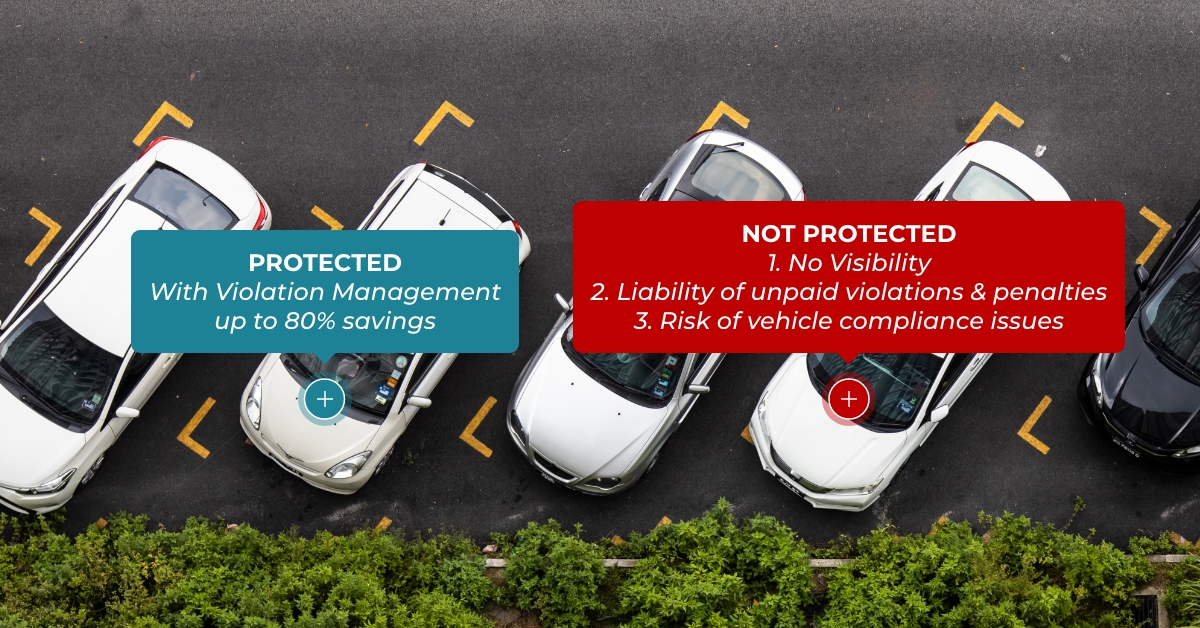
Belinda Olivares to lead new Bus Safety Division
December 4, 2024
What We Learned in 2024
December 17, 2024
Fleet vehicles are accumulating millions of violations each year, including parking, tolls, and photo enforced (speed and red light) tickets.
Since 2022, the number of violations issued to fleets has steadily grown by 20%. This surge in violations presents significant challenges for fleet management.
Challenges of Manual Violation Processing
Without a dedicated processing solution, fleets face escalating costs, limited fleet-wide visibility and time-consuming administrative burdens.
- Cost Liability
- Registration Holds
- Administrative Burden
- Lack of Visibility

Cost Liability
Manual processing often leads to delays in resolving violations, resulting in substantial penalties on top of initial fines. For example, the average fine for parking and speed camera violations has risen 11% since 2023 to $85. Unpaid violations can further escalate costs, with non-toll violations increasing to $141 (a 66% increase).
Registration Renewal Holds
Unpaid violations can trigger vehicle registration holds with state departments of motor vehicles, hindering fleet operations and creating administrative bottlenecks when it comes time to renew a vehicle's registration or sell off assets.
Administrative Burden
Manual processing involving paper-based systems, multiple payment accounts, and evolving regulations creates a significant administrative burden. Tracking violations, pursuing driver reimbursement, and staying ahead of legal complexities consume valuable time and resources.

Lack of Visibility
Even with timely payment efforts, fleet managers often lack clear visibility into issued violations. Inconsistent notification processes and varying enforcement practices across jurisdictions further complicate the task of identifying, assigning, and resolving violations.
Benefits of a Violation Processing Solution
A comprehensive violation processing solution can mitigate these challenges by:
- Reducing Costs: Timely resolution of violations minimizes penalties and late fees.
- Ensuring Compliance: Maintaining compliance requirements avoids costly disruptions or inoperability.
- Streamlining Administration: Automating processes, centralizing payment management, and providing real-time violation tracking frees up valuable time and resources.
- Improving Visibility: Gaining a clear overview of all violations facilitates prompt action and cost control.
By partnering with a violation processing provider, fleets can optimize efficiency, reduce costs, and ensure compliance, allowing them to focus on core business operations.

Simplify Fleet Challenges with Verra Mobility Violation Solutions
Violation processing providers, such as Verra Mobility, are an effective way to solve fleet challenges and act as a one-stop shop, so fleets don’t have to worry about the tasks associated with violation processing.
Verra Mobility serves the world’s largest commercial fleets and rental car companies, managing violations for over 3.7 million vehicles, easing the burden of violations for fleets. A leading provider of connected systems, Verra Mobility processes millions of transactions each year through connectivity with more than 450+ issuing authorities.

With full-service solutions to address tolling, violations and title registration needs, Verra Mobility has flexible, scalable products to reduce paperwork, save money and simplify the complexities that fleet managers face. To learn how our team can help you streamline your violation processing more efficiently, contact a Verra Mobility representative today.




